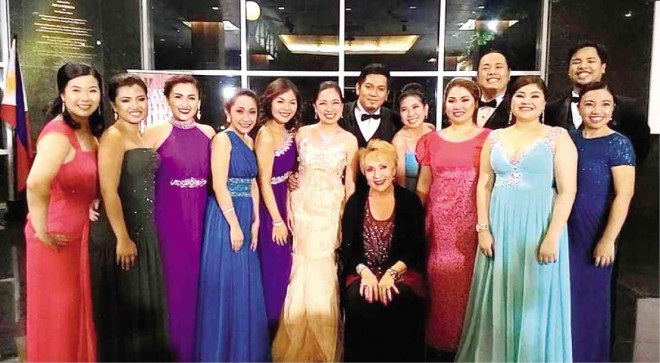The young and promising often take master classes to strengthen their profiles as artists.
Through master classes, they learn from veteran artists, the more famous, the better.
Pianists aspire to be able to include in their biodata tutelage by Van Cliburn or Susan Starr or Cecile Licad.
For violinists, it pays to have taken master classes under Itzhak Perlman or Vladimir Spivakov or perhaps Joshua Bell.
Who do voice students want to learn from?
The story of the great diva Maria Callas and her imaginary encounter with students of the Juilliard School became an acclaimed play, “Master Class,” written by Terrence McNally.
Soprano Nelly Miricioiu admitted to her Filipino fans she cried when she first saw the play, with the character Callas telling the audience, “You people don’t know what we go through!”
Miricioiu said, “The tears were for all artists’ lives and my own. Passion is a burning thing, an active energy.”
While the play is a fictional account of what goes on in a master class, 15 Filipino voice students had the good fortune to actually experience being in such a class.
Miricioiu conducted master classes for free early this month at the Ayala Museum in Makati City after her March 6 Meralco Theater concert. Auditions were conducted to choose the students and 15 were accepted.
The Romanian diva taught students aria interpretation and other things related to performance. Organized by the MCO Foundation, the master classes we re the first to be conducted by Miricioiu in Manila. Abroad, she often holds classes in London and Amsterdam.
But just what is the difference between a master and an ordinary class?
In a master class, as all students (observers are often very welcome) watch and listen, the “teacher” gives individualized instruction. A student performs a piece of his/her choice and the master offers suggestions on how he/she can better interpret the song.
The coach tells stories on the composers and their intentions to help the student improve his/her performance.
Shortly before she left for London, Miricioiu presented her students in a special recital, working hard to make the show appealing to the audience. The singers learned movements that looked spontaneous while their voices soared with newfound vocal freedom.
The acclaimed diva did not rely on vocal theories. Very much in touch with reality, she shared what she knew and had learned by first-hand experience.
The result was a good give-and-take, with both pupils and teacher benefiting from the three-day master classes.
“I like the scientific things they teach you about the human voice,” Miricioiu said in a press conference. “But I also trust my instinct about how a certain piece should be sung. I try to learn from both.”
For the diva, a master class was not a venue to show off what one knew. It was more an opportunity to size up a talent and see how far it could go.
She defined her approach to a music writer during the master classes she conducted at the Guildhall School of Music and Drama: “When I started to do master classes, I looked around at my colleagues and I could see that you just couldn’t learn everything in a week. I’m not the type of person who wants to do master classes to make myself look clever or to show off.”
Miricioiu said it paid to connect with the students. “I really love my kids and I really want them to get something out of it. What I’m doing more and more —because I’m learning as I go— is to try and connect with everyone’s personality, to inspire them to have confidence in their talent, to inspire them to search and not to be stuck with just one teacher’s knowledge. Every teacher has limitations, and, as a student, your duty is to find your way through.”
As for technique, she said, “Yes, you have to know about technique, but you also have to promote your instincts. I don’t want to be like a textbook: The life element has to be there. Unfortunately, I’ve seen a lot of kids nowadays who are so obsessed with technical issues that they do it at the expense of art. I want something that has an energy, that doesn’t stop.
“For me, technique on its own means that the energy has stopped. I want my kids to start looking at the words and to understand why the music is there, why the pauses are there. So if I can trigger something that opens a door for them in that week, I’ll be perfectly happy.”
The diva apparently treated life as a big ongoing master class and the lessons she learned immensely more absorbing than music theories.
Master class pianist Gabriel Allan Paguirigan told observer Elizabeth Lolarga, “Ms Miricioiu is good at connecting with the audience. Everything she sings takes a life of its own. I also like her sense of humor. That’s why Filipinos love her, but she is really strict. She is very detailed and has a penchant for details. When she doesn’t like something, she will have it repeated over and over until the student gets it. Her patience is incredible.”
Pianist Farley Asuncion, who was at Miricioiu’s concert, said, “I love the fact that the timbre of her voice has some similarities to Maria Callas… watching her live in that wonderful recital of hers and Najib Ismail’s taught everyone what the word ‘diva’ really means—a true servant of her art, filled with genuine humility and generosity.”
Other master class observers included nonsinger Jullie Yap- Daza and business entrepreneurs Francis and Joy Onglatco.


